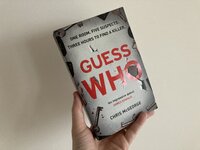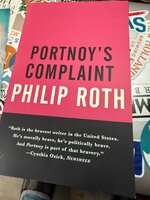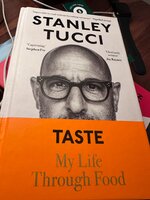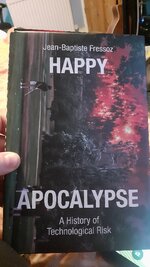You are using an out of date browser. It may not display this or other websites correctly.
You should upgrade or use an alternative browser.
You should upgrade or use an alternative browser.
2025 Reading Challenge
- Thread starter Selaws
- Start date
avecigrec
Well-Known Member
03. The Mine Wars: The Bloody Fight for Workers' Rights in the West Virginia Coalfields by Steve Watkins
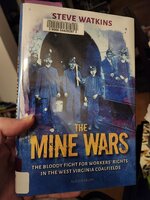
A breezy but comprehensi.ve read covering a corner of U.S. history not generally discussed. I have spent a lot of time living and playing in mining towns throughout BC, the Yukon and Alberta, and have read up a lot on their histories, but had never really dug too much into West Virginia, beyond Steve Earle's Ghosts of West Virginia album, which is centered around the Upper Big Branch Mine disaster of 2010. Watkins does a great job of putting the reader into the hills of 1920 West Virginia, with plenty of supplemental photos and clippings helping paint the picture. The tone of his writing is more casual and conversational than academic historical, and he does a great job trying to portray all sides in the biggest labour dispute in U.S. history.

A breezy but comprehensi.ve read covering a corner of U.S. history not generally discussed. I have spent a lot of time living and playing in mining towns throughout BC, the Yukon and Alberta, and have read up a lot on their histories, but had never really dug too much into West Virginia, beyond Steve Earle's Ghosts of West Virginia album, which is centered around the Upper Big Branch Mine disaster of 2010. Watkins does a great job of putting the reader into the hills of 1920 West Virginia, with plenty of supplemental photos and clippings helping paint the picture. The tone of his writing is more casual and conversational than academic historical, and he does a great job trying to portray all sides in the biggest labour dispute in U.S. history.
ayayrawn
Well-Known Member
1. The Message - Ta-Nehisi Coates. An aside from from my Kindle. Several essays on writing and it's effect on the south, israel/palestine, and Coates himself. Some really insightful stuff in here, and ghe major essay on Palestine that takes of the bulk of the book is pretty essential, I'd say. Good read.
About 400 pages into Infinite Jest, which is taking up most of my reading time. It's not an easy one.
About 400 pages into Infinite Jest, which is taking up most of my reading time. It's not an easy one.
Rowan
Well-Known Member
Book 4 - Living Things - Munir Hachemi
Considering this was about 100 pages long it took a bit of edgier to get through (eventually polished it off in an airport after a running out of episodes of a brilliant podcast about Winds of Change by the Scorpians).
I think I was seduced by comparisons to Bolano in the reviews. The Savage Detectives was thrown about liberally and the concept was genuinely interesting. But it just didn’t land. First from this collection of books that I’ve not quite got on with (although the middle section of the book did flow reasonably well). Would be interested if anyone else has picked it up and enjoyed it more than I did (I suppose the English Pen Award nomination implies that is actually the case though).
Anyway… it’s short enough that I may try it again but it’s sent me rushing back into Denis Johnson’s arms for my next one (as well as finishing of an excellent but hefty one at night)
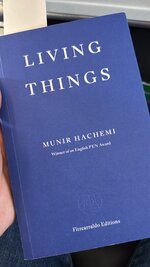
Considering this was about 100 pages long it took a bit of edgier to get through (eventually polished it off in an airport after a running out of episodes of a brilliant podcast about Winds of Change by the Scorpians).
I think I was seduced by comparisons to Bolano in the reviews. The Savage Detectives was thrown about liberally and the concept was genuinely interesting. But it just didn’t land. First from this collection of books that I’ve not quite got on with (although the middle section of the book did flow reasonably well). Would be interested if anyone else has picked it up and enjoyed it more than I did (I suppose the English Pen Award nomination implies that is actually the case though).
Anyway… it’s short enough that I may try it again but it’s sent me rushing back into Denis Johnson’s arms for my next one (as well as finishing of an excellent but hefty one at night)

Thackeraye
Well-Known Member
Selaws
Well-Known Member
Ah nice, I really enjoyed this. Like you said, easy and fun readView attachment 226582
Appropriately, I used this book as a palate cleanser to get me back into reading, as I'm labouring through another book (more my fault that its, I think). An enjoyable, easy read.
Matt M
Santa Extraordinaire
Way ahead of last year at this point, guessing die to being paid up from surgery for a while. Working through the pile!
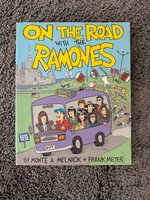
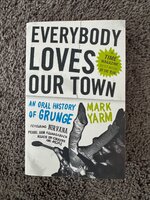
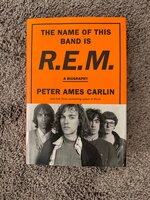
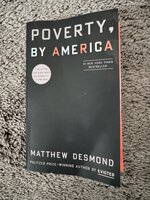
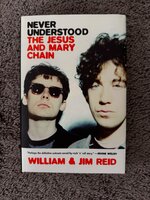
The music docs were all great, I really enjoy learning more about bands and their back stories.
Poverty by America was a quick read that really informed. Loved the details linked to actual facts. A bit of an eye opener, you can feel like you have an idea about things and really not. Need to include more books like this in my future to keep more rounded on issues. Thanks to the rec here!





The music docs were all great, I really enjoy learning more about bands and their back stories.
Poverty by America was a quick read that really informed. Loved the details linked to actual facts. A bit of an eye opener, you can feel like you have an idea about things and really not. Need to include more books like this in my future to keep more rounded on issues. Thanks to the rec here!
jamieanderson1968
ninniest jackaninny
Really enjoy the Reid's book. Loved how they often contradicted each other.Way ahead of last year at this point, guessing die to being paid up from surgery for a while. Working through the pile!
View attachment 226775View attachment 226776
View attachment 226777View attachment 226778View attachment 226779
The music docs were all great, I really enjoy learning more about bands and their back stories.
Poverty by America was a quick read that really informed. Loved the details linked to actual facts. A bit of an eye opener, you can feel like you have an idea about things and really not. Need to include more books like this in my future to keep more rounded on issues. Thanks to the rec here!
ranbalam
Well-Known Member
Book 4 - Demian - Hermann Hesse
I found this while my wife and I did a re-org of our office and bookshelves. Someone loaned this to me long ago and I had kind of forgotten about it. So instead of the donate pile, I put it in my to-read pile. Pretty quick read, although dense in spots. It was my first Hesse, but I think I'll read more at some point.
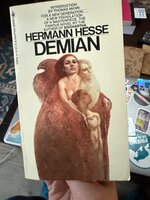
I found this while my wife and I did a re-org of our office and bookshelves. Someone loaned this to me long ago and I had kind of forgotten about it. So instead of the donate pile, I put it in my to-read pile. Pretty quick read, although dense in spots. It was my first Hesse, but I think I'll read more at some point.

avecigrec
Well-Known Member
It was my first Hesse, but I think I'll read more at some point.
I recommend Siddhartha. I read that one 3 or 4 times in my twenties. I should probably revisit it myself, all these years later.
avecigrec
Well-Known Member
04. Where The Body Was by Ed Brubaker & Sean Phillips
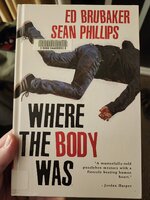
A great breezy read during our drive up-Island this afternoon. Brubaker & Phillips don't seem to miss. This one takes place in 1984 in a suburban neighborhood; told through a variety of perspectives by the people who were around as the events unfolded, and everybody's stories seem to unravel along the way. Very satisfying.

A great breezy read during our drive up-Island this afternoon. Brubaker & Phillips don't seem to miss. This one takes place in 1984 in a suburban neighborhood; told through a variety of perspectives by the people who were around as the events unfolded, and everybody's stories seem to unravel along the way. Very satisfying.
Bull Shannon
Well-Known Member
Book 3: My Brilliant Friend, by Elena FerranteBook 2: The Hitchhiker’s Guide to the Galaxy, by Douglas Adams
View attachment 224859
I’ve been contemplating annihilation recently, and considering the absurd circumstances of our present fate, thought a bit of silliness was in order. I’ve read the Guide before, having had it personally placed in my hands by a shrewd high school teacher who truly was in the right place at the right time. He said this is a book everyone should read once, a lesson driven home on second reading.
This one went down rather clunky this time around. Maybe I’ve aged out of humorist writing. Don’t get me wrong: I like books with humor, but comedic, joke-based fiction increasingly strains my receptors; one can feel the author taking pride in their cleverness and sacrificing pace and immersion for goofy digressions. When you’re having fun with the blend of heady sci-fi with uncle humor it’s easy to overlook the story, but when the concepts are no longer surprising and you know the punchlines, you’re left with more space to notice the pattern of cleverly-but-recursive expositional conversations punctuated by a chase or gunfight, concluding in a miraculous-but-silly escape. The characters are defined solely by their wackiness or their normality, and each fades to the background as Adams introduces the next one.
Now, I really try not to bring the outside world into my experience of a book, and especially not my assessment of it or how I express it. But memetics haven’t served this book well; 42 has gone from an answer without a question to a punchline without a setup. It all feels a bit like revisiting badger badger badger mushroom mushroom: any absurdity has been bashed repeatedly into the dirt. It’s hard to read the Hitchhiker’s Guide knowing there’s a piece of space junk currently orbiting the planet bearing the monogram DONT PANIC, carrying a copy of the book and a towel, and that the person responsible understands humor like Vogons do poetry.
I hope I’m not coming off as bragging about having read this book “when it was cool;” it’s simply that I read it when I wasn’t online. That’s on me but, in a more real and accurate way, it’s on everyone else but me.
I’m hoping to continue the series through the year; I haven’t read past this first book, and hope i can keep an open mind for the next three of the trilogy.
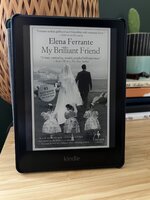
I managed to go without hearing of this book until a couple months ago, when the Times published their list of the 100 best books of the century so far; this one headed the list with what seems to be unanimous praise.
And I’d say it lives up to the hype; Ferrante’s prose is simple, direct and propulsive, but still carries a certain beauty. You really come to feel that the apartments/village these girls live in is their entire world. My only gripe is I wish I’d bought a physical copy; the cast of characters is deceptively large, and I’d have flipped to the character list more often (flipping is prohibitive on an ebook reader!).
Book 4: You Dreamed of Empires, by Alvaro Enrigue
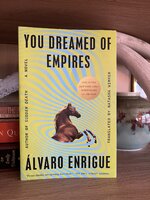
This popped up on my radar as one of NYT’s best books of 2024, and the description sounded up my alley: an alternate history retelling of the meeting of Moctezuma and Hernando Cortez, told with Borges-ian surrealism and recognition that the conquistadors probably didn’t wipe their asses well.
The book itself is a bit different from that description; Enrigue sort of paints a portrait of the days and moments before and after the meeting; and while the book is structured with sections before, during, and after a nap taken by Moctezuma, the narrative constantly flits about these moments with little distinction given the reader. Along with this and an adherence to cultural lingo as well as a complete lack of quotation marks and paragraph breaks between speakers, it’s hard to get one’s arms around what’s happening in the book.
The effect is a deliberately confusing, psychedelic mess. I’m glad I stuck it out, but I’m still wrestling with the overall effect.
Book 5: Orbital, by Samantha Harvey
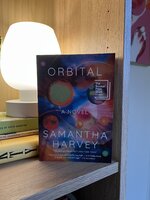
This seemed up my alley: literate, emotional, scientific fiction. Harvey presents a portrait of six astronauts in orbit as they contemplate their relationships with the Pale Blue Dot, shifted via new perspective.
Unfortunately, the prose is claggy, and Harvey can’t help but append each detail with a list of more details, repeated details, repetitive details; there’s a wordcount-padding sense that if you’re going to mention a kitchen, you’d best mention the refrigerator, stove, cupboard, dishwasher, sink. I don’t know if there’s a name for the rhetorical device of calling something “big and small,” or “everything and nothing,” but it really clangs when you see it on every page:
Yet it's clearly not that kingly earth of old, a God-given clod too stout and stately to be able to move about the ballroom of space; no. Its beauty echoes - its beauty is its echoing, its ringing singing lightness. It's not peripheral and it's not the centre; it's not everything and it's not nothing, but it seems much more than something. It's made of rock but appears from here as gleam and ether, a nimble planet that moves three ways - in rotation on its axis, at a tilt on its axis, and around the sun. This planet that's been relegated out of the centre and into the sidelines - the thing that goes around rather than is gone around, except for by its knobble of moon. This thing that harbours we humans who polish the ever-larger lenses of our telescopes that tell us how ever-smaller we are. And we stand there gaping. And in time we come to see that not only are we on the sidelines of the universe but that its of a universe of sidelines, that there is no centre, just a giddy mass of waltzing things, and that perhaps the entirety of our understanding consists of an elaborate and ever-evolving knowledge of our own extraneousness, a bashing away of mankind's ego by the instruments of scientific enquiry until it is, that ego, a shattered edifice that lets light through.
Every page is like this.
mdmost
Well-Known Member
Finished this tonight and I'm really glad I read it. There was so much about MLK that was just glossed over or fluffed up in the retelling of his life when I was growing up. It got me a little bitter about how his message has been co-opted by those who would rather not reconcile that there's still racism in this country to be squashed. I had no idea he was very much against the Vietnam War and spoke out about it frequently which led to public opinion turning on him. Very reminiscent of the pre-Iraq War 2.0 time. It also talked about his championing of fighting poverty as a key to undoing the wrongs of slavery and Jim Crow. There were a lot of parallels in the message of what Dr King talked about around poverty and what the last book I read, Poverty by America had to say.My February book that I've been really excited to get to. I've been to both MLK's birthplace and where he was taken from the world. I'm glad to start this so I can learn a lot more about his life and fill in the gaps that my education never covered.

This also didn't shy away from his infidelity and his flaws as a person. It also shined a huge spotlight on the governmental apparatuses (even unlikely people like RFK) that sought to discredit him at every turn. The constant paranoia about communism makes me want to investigate books on the McCarthy Red Scare hearings. The 60s era was such a fascinating time in our nation's history. I also want to check out more books on it.
Since I have some time left in the month to get another book in, I'm going to try to work on this book that always caught my eye at the bookstore so I decided to go ahead and try it out.

Last edited:
Rowan
Well-Known Member
Book Five
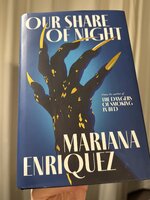
Been picking away at this for a few weeks and finally finished after buying it and leaving it on the shelf about 2 years ago. I’ve read Dangers of Smoking In Bed and Things We Lost In The Fire so was interested to know how Enriquez would carry into long form… and this is long! 700 plus pages of Argentinian crazy. It’s told through a couple of perspectives and uses first, second and third person narratives quite liberally. Also a bit of time hopping in places. It’s possibly more unsettling than scary. I’d not say it’s a horror by any stretch. More a dysfunctional occult family yarn. Never felt like a long book and I’m looking forward to moving in to her new collection of shorts which is also sitting in the to read pile.

Been picking away at this for a few weeks and finally finished after buying it and leaving it on the shelf about 2 years ago. I’ve read Dangers of Smoking In Bed and Things We Lost In The Fire so was interested to know how Enriquez would carry into long form… and this is long! 700 plus pages of Argentinian crazy. It’s told through a couple of perspectives and uses first, second and third person narratives quite liberally. Also a bit of time hopping in places. It’s possibly more unsettling than scary. I’d not say it’s a horror by any stretch. More a dysfunctional occult family yarn. Never felt like a long book and I’m looking forward to moving in to her new collection of shorts which is also sitting in the to read pile.
LeSamourai
Well-Known Member
Book Five
View attachment 227212
Been picking away at this for a few weeks and finally finished after buying it and leaving it on the shelf about 2 years ago. I’ve read Dangers of Smoking In Bed and Things We Lost In The Fire so was interested to know how Enriquez would carry into long form… and this is long! 700 plus pages of Argentinian crazy. It’s told through a couple of perspectives and uses first, second and third person narratives quite liberally. Also a bit of time hopping in places. It’s possibly more unsettling than scary. I’d not say it’s a horror by any stretch. More a dysfunctional occult family yarn. Never felt like a long book and I’m looking forward to moving in to her new collection of shorts which is also sitting in the to read pile.
I read this one in 2021 (in Spanish), most of it while home alone at night while the rest of my family was on a trip. When I lived in Argentina, I lived in the northeastern part, which is where most of the first part of the book takes place, so I was able to really imagine the settings and people vividly. I might read it again sometime soon, because it's one that stuck with me.
Last edited:
ranbalam
Well-Known Member
Book 5 - Dengue Boy by Michel Nieva
I can't recommend this book. Either the translation was really bad, or I just don't like Nieva's style. It was short so I powered to the end but it was almost a DNF. The premise sounded great so I bought it, but the writing style is came across as simple, crass, and immature to me.
Oh, and he uses parentheses WAY too much. I think it was done to add humor, but no, it didn't work.
Here's a couple examples of the writing...
When she got home at night she was too tired to do much, and having endured her bosses’ rough treatment all day she had no patience left. Sometimes when she opened the door and saw the mess Dengue Boy had left on the table and the floor (he didn’t mean to but he had no hands), she would scream, ‘Stupid bug! Look what you’ve done!’
‘Hey, fly crud, is it true your mom’s c*nt is a smelly hole full of worms and cockroaches and other bugs and that’s why you came out the way you did?’
Immediately Dengue Boy’s little antennae would begin to quiver with rage and indignation, and his tormentors would run off laughing, leaving Dengue Boy behind to nurse his sorrows.
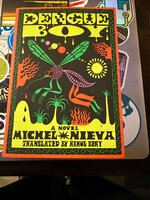
I can't recommend this book. Either the translation was really bad, or I just don't like Nieva's style. It was short so I powered to the end but it was almost a DNF. The premise sounded great so I bought it, but the writing style is came across as simple, crass, and immature to me.
Oh, and he uses parentheses WAY too much. I think it was done to add humor, but no, it didn't work.
Here's a couple examples of the writing...
When she got home at night she was too tired to do much, and having endured her bosses’ rough treatment all day she had no patience left. Sometimes when she opened the door and saw the mess Dengue Boy had left on the table and the floor (he didn’t mean to but he had no hands), she would scream, ‘Stupid bug! Look what you’ve done!’
‘Hey, fly crud, is it true your mom’s c*nt is a smelly hole full of worms and cockroaches and other bugs and that’s why you came out the way you did?’
Immediately Dengue Boy’s little antennae would begin to quiver with rage and indignation, and his tormentors would run off laughing, leaving Dengue Boy behind to nurse his sorrows.

ranbalam
Well-Known Member
My ratings on the the last three books I've read have been 3, 3, and 2 out of 5.
In other words, there's been nothing special in my early 2025 reads. I need to either lean on an author I already love, or read more reviews to narrow it down to something I'll be really into. I do have a couple recommended books on order from my local.
I read some excellent stuff in 2024, both fiction and non-fiction.
Is it Paul Auster time? I'm an Auster virgin.
A friend told me his current favorite writer is David Mitchell, maybe I'll check him out.
In other words, there's been nothing special in my early 2025 reads. I need to either lean on an author I already love, or read more reviews to narrow it down to something I'll be really into. I do have a couple recommended books on order from my local.
I read some excellent stuff in 2024, both fiction and non-fiction.
Is it Paul Auster time? I'm an Auster virgin.
A friend told me his current favorite writer is David Mitchell, maybe I'll check him out.
